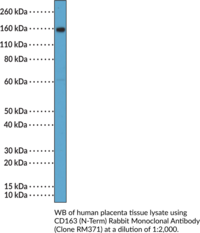Territorial Availability: Available through Bertin Technologies only in France
- Correlated keywords
- sCD CD-163 RM-371 IL6 IL10 IL4 TNF? IFN? HpHb Lipopolysaccharide antiinflammatory
- Product Overview:
CD163 is a member of the scavenger receptor family that has a role in inflammation.{60195,60196} It is composed of an N-terminal ectodomain, which contains nine scavenger receptor cysteine-rich (SRCR) class B domains that mediate protein-protein interactions, a transmembrane segment, and a short cytoplasmic tail.{60195,60194} Alternative splicing of the CD163 pre-mRNA produces several isoforms, including three variants that differ in length of the cytoplasmic tail.{60194} CD163 is expressed on the surface of monocytes and macrophages and used as a marker of M2 alternatively activated macrophages.{60195} CD163 protein levels are increased by hemoglobin, IL-6, IL-10, or glucocorticoids and decreased by LPS, IL-4, TNF-?, or IFN-?.{60195,60197} It binds to and internalizes haptoglobin-hemoglobin (Hp-Hb) complexes, leading to degradation of the Hp-Hb complex and production of anti-inflammatory heme metabolites.{60195} A soluble form of CD163 (sCD163), resulting from proteolytic cleavage of membrane-bound CD163, has been found in plasma and other tissue fluids.{60194} CD163+ macrophages in inflamed tissues or plasma sCD163 levels are increased in numerous acute or chronic inflammatory diseases, including sepsis, atherosclerosis, rheumatoid arthritis, and multiple sclerosis.{60195,60196} Cayman’s CD163 (N-Term) Rabbit Monoclonal Antibody can be used for immunohistochemistry (IHC) and Western blot (WB) applications.
Cayman Chemical’s mission is to help make research possible by supplying scientists worldwide with the basic research tools necessary for advancing human and animal health. Our utmost commitment to healthcare researchers is to offer the highest quality products with an affordable pricing policy.
Our scientists are experts in the synthesis, purification, and characterization of biochemicals ranging from small drug-like heterocycles to complex biolipids, fatty acids, and many others. We are also highly skilled in all aspects of assay and antibody development, protein expression, crystallization, and structure determination.
Over the past thirty years, Cayman developed a deep knowledge base in lipid biochemistry, including research involving the arachidonic acid cascade, inositol phosphates, and cannabinoids. This knowledge enabled the production of reagents of exceptional quality for cancer, oxidative injury, epigenetics, neuroscience, inflammation, metabolism, and many additional lines of research.
Our organic and analytical chemists specialize in the rapid development of manufacturing processes and analytical methods to carry out clinical and commercial GMP-API production. Pre-clinical drug discovery efforts are currently underway in the areas of bone restoration and repair, muscular dystrophy, oncology, and inflammation. A separate group of Ph.D.-level scientists are dedicated to offering Hit-to-Lead Discovery and Profiling Services for epigenetic targets. Our knowledgeable chemists can be contracted to perform complete sample analysis for analytes measured by the majority of our assays. We also offer a wide range of analytical services using LC-MS/MS, HPLC, GC, and many other techniques.
Accreditations
ISO/IEC 17025:2005
ISO Guide 34:2009
Cayman is a leader in the field of emerging drugs of abuse, providing high-purity Schedule I-V Controlled Substances to federally-licensed laboratories and qualified academic research institutions for forensic analyses. We are certified by ACLASS Accreditation Services with dual accreditation to ISO/IEC 17025:2005 and ISO Guide 34:2009.

